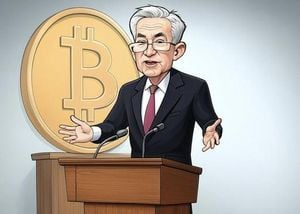In a significant turn of events for the semiconductor industry, Taiwan Semiconductor Manufacturing Company (TSMC) is facing a decline in its stock prices amid news of increasing competition from Chinese tech giant Huawei. On April 28, 2025, TSMC's share price dropped by 1.4% as of 3:30 p.m. ET, reaching a low of 2.8% earlier in the trading session. This decline has sparked concerns among investors about TSMC's position in the rapidly evolving semiconductor landscape.
The catalyst for this downturn appears to be Huawei's latest advancements in artificial intelligence (AI) technology. Reports indicate that Huawei is testing a new AI chip, the Ascend 910D, which is anticipated to rival the performance of Nvidia's leading semiconductors. Notably, Nvidia relies on TSMC to fabricate its semiconductor designs, placing both companies at the forefront of the ongoing tech race between the U.S. and China.
According to The Wall Street Journal, Huawei is collaborating with various tech industry partners to explore the capabilities of the Ascend 910D. The company reportedly believes that this new processor will outperform Nvidia's H100 chip, which, while powerful, is not the most advanced in Nvidia's lineup. Additionally, Reuters has reported that Huawei could begin shipping its Ascend 910C AI processor to customers as early as May 2025.
These developments come against the backdrop of U.S. restrictions that prohibit the sale of Nvidia's high-end processors and advanced chips manufactured by TSMC to the Chinese market. Despite these restrictions, Huawei's advancements could mark a significant leap for China in the AI sector, raising questions about TSMC's competitive edge.
As Huawei's new chip designs are being fabricated by Semiconductor Manufacturing International Corporation (SMIC), China's largest chip foundry, the potential for a major shakeup in the AI market looms large. If SMIC can deliver strong production yields on Huawei's designs that meet or exceed those of Nvidia's powerful AI processors, the competitive landscape may shift dramatically.
While TSMC continues to maintain a significant lead in advanced chip foundry services, investors are closely monitoring whether SMIC is catching up. The H100 chip, although not Nvidia's strongest offering, is suitable for a wide range of applications, and its competition could impact TSMC's market position.
In a related development, Taiwan is tightening its control over exports of advanced semiconductor technologies and outbound investments. As reported on April 28, 2025, the Taiwanese government is implementing new legal measures that will enforce the 'N-1' technology restriction. This policy effectively bars TSMC from exporting its latest production nodes, allowing only one generation older technology to be deployed abroad.
Premier Cho Jung-tai confirmed that this 'N-1' policy will impact TSMC's planned production in the United States. Previously, Taiwan's regulations did not explicitly require such controls for semiconductor manufacturing processes. This new approach reflects rising geopolitical tensions and concerns about national security.
The new rules are based on Article 22 of the amended Industrial Innovation Act, which is expected to take effect by the end of 2025. Currently, TSMC's leading-edge node is the N3P manufacturing technology. By the end of 2025, TSMC will begin producing chips using its upcoming N2 fabrication process, which is set to become its flagship technology.
Looking ahead, TSMC anticipates having two flagship nodes starting from late 2026: N2P for client applications that do not require advanced power delivery, and A16, which features Super Power Rail backside power delivery for high-performance computing (HPC) applications. However, it remains uncertain which of these process technologies will be classified as 'flagship' by Taiwanese authorities and subsequently restricted for export.
The amended law also grants Taiwanese authorities the power to reject or cancel overseas investments if they are deemed to compromise national security, harm the country's economic development, violate treaty obligations, or lead to major labor disputes. This legislative change elevates existing investment restrictions from sub-regulations to formal legislation, introducing legal consequences for non-compliance.
Companies investing abroad without prior approval may face fines ranging from NT$50,000 to NT$1 million (approximately $30,830). If an approved investment later triggers any of the aforementioned risks, authorities can impose repeated fines ranging from NT$500,000 ($15,414) to NT$10 million ($308,286).
Despite these potential penalties, TSMC's plans to invest $165 billion in its U.S. facilities are unlikely to be significantly impacted by fines of this nature. The company's substantial financial commitment indicates its intent to expand its production capacity in the U.S. amid growing demand for semiconductor technology.
As the semiconductor industry continues to evolve, TSMC's ability to navigate these competitive and regulatory challenges will be crucial for its future success. Investors and industry observers alike will be watching closely to see how TSMC responds to the emerging threats posed by Huawei and SMIC, as well as the implications of Taiwan's new export restrictions.



